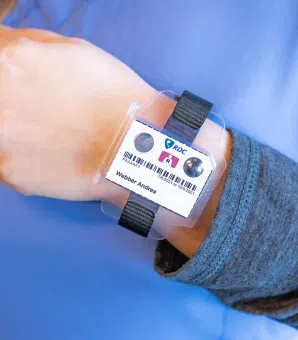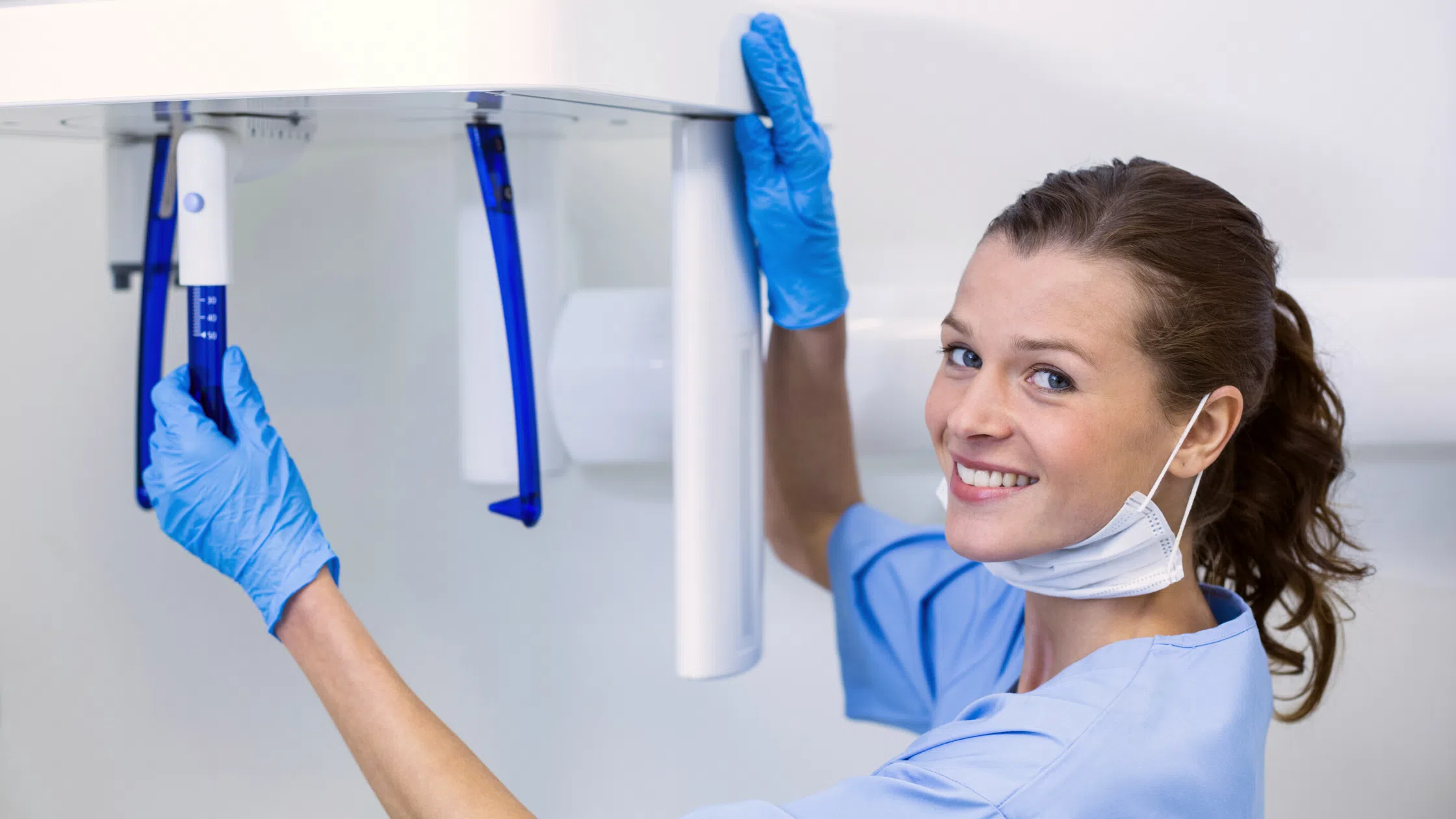
Dosimeter badge services for medical, dental, and veterinary businesses
Learn how Radiation Detection Company’s easy-to-use dosimetry solutions can boost the efficiency of your practice.
When it comes to dentistry, x-rays are a daily occurrence for both staff and patients. To help keep your dental staff safe, it's vital to measure their exposure to radiation. So long as you follow proper safety protocols, occupational exposure should be minimal. To ensure you’re managing exposure correctly, it’s vital to invest in radiation badges for dental offices that track exposure.
In this article, we will discuss the sources of radiation in dental offices, why radiation badges are important, which members of the staff should wear them, and best practices with respect to badge usage.
X-rays are the most common radiation type when it comes to ionizing radiation. These machines emit a small amount of ionizing radiation - on average between 0.5-1 mrem per image. A full-mouth x-ray series (which includes 18 to 20 images), usually only delivers a dose of about 10-20 mrem.
CBCT emits a higher amount of radiation than traditional x-ray machines. These machines produce 3 dimensional images of teeth, gums, and other oral structures. On average, a CBCT scan delivers a dose of 20-60 mrem per scan.
Handheld x-ray devices emit a lower amount of radiation than traditional x-ray machines. These devices take x-rays of individual teeth or small areas of the mouth. On average, a handheld x-ray device emits between 1-5 mrem per image. Handheld x-ray devices though pose some additional risk as personnel are not able to distance themselves during exposure and from that run a higher risk.

Curing lights emit a small amount of non-ionizing radiation. They are used to harden dental materials, such as fillings and sealants, and they typically emit less than 1 mrem per use.
UV lights also emit a small amount of non-ionizing radiation. They are sometimes used to detect oral cancer or other issues, and typically emit less than 1 mrem per use.
Gamma radiation has proven to be an efficient way to sterilize extracted teeth, as alterations of dentin and the enamel mechanical properties are minimal.
As we’ve read, there are numerous sources of radiation that dental workers can encounter which is why radiation badges for dental offices are critical for keeping them healthy. Radiation badges (also known as dosimeters) are recommended in dental offices to monitor the amount of radiation exposure over time that is received by personnel who work with ionizing radiation. While they are not always required, radiation badges for dental offices play a crucial role in employee safety, while also helping to minimize company liability. Responsibility for damage caused by exposure to radiation in the workplace is most often assigned to the employer.
Employers utilizing sources of radiation in their business are regulated by the states for safe use. Exposure to hazardous radiation is governed by laws that are designed to protect employees through the safe handling and use of radioactive sources. Radiation damage experienced by employees is most often an indication of failing to abide by these laws, which leaves the employer exposed to legal liability for the damage caused.

Developing and implementing a radiation safety program - and maintaining improved dosimetry compliance - ensures that the documented occupational dose always remains within safe limits. This ultimately can assist employers in limiting their exposure to liability in the workplace.
Minimizing radiation exposure also minimizes the risk of long-term health effects (like cancer and other radiation-induced illnesses). When it comes to radiation exposure, ALARA is the most important acronym to know. It stands for “as low as reasonably achievable,” which simply means that the goal of any radiation safety program is to keep radiation doses as low as reasonably possible.
When deciding who should be wearing radiation badges for dental offices, it’s key to look at who faces the most exposure to radiation. Dentists and hygienists, as they are most likely to work directly with X-ray machines or CBCT scanners (which are the primary sources of ionizing radiation in a dental office),should wear dosimeter badges. Dental assistants should also wear them, as they may also work with these machines. Certain office staff - including any staff who handle or process x-ray film - as well as staff who work in the processing area, should also wear a badge to document radiation exposure and mitigate the risk.
For a deeper look into how badges should be handled, where they should be worn, where they should be stored when not in use, how to closely track exposure, simplifying dose reads, and more, please refer to our recent article, Dosimeter 101: Instructions on Radiation Badge Use.

Every employee monitored benefits from radiation monitoring, as they are able to work with peace of mind knowing that their health is not at risk. The company's ownership is also a beneficiary, since documented occupational dose monitoring provides protection against current and future legal health claims by an employee (so long as the owner is able to show documented evidence that his/her employees did not exceed their occupational dose limits during their term of employment). For this reason, detailed dose records should be kept for the lifetime of the business.
Providing workers with personal radiation dosimeter badges gives both the worker and employer peace of mind knowing that radiation exposure is constantly being monitored by a fully accredited dosimeter.
Whether you’re looking for radiation badges for dental offices or archeology, Radiation Detection Company is dedicated to keeping all employees safe from overexposure. We have 75 years of experience providing the highest quality dosimetry service to over 28,000 companies nationwide.
Want to take the next step in getting your dental office or organization set up with RDC’s radiation safety products? Please visit our Solutions page to view our full suite of offerings. We offer a wide range of affordable and comprehensive solutions to fit the needs of any organization, large or small. Have a question that we did not address in this article? Please reach out to our Customer Care team, and one of our specialists will be happy to assist you.
Learn how Radiation Detection Company’s easy-to-use dosimetry solutions can boost the efficiency of your practice.
